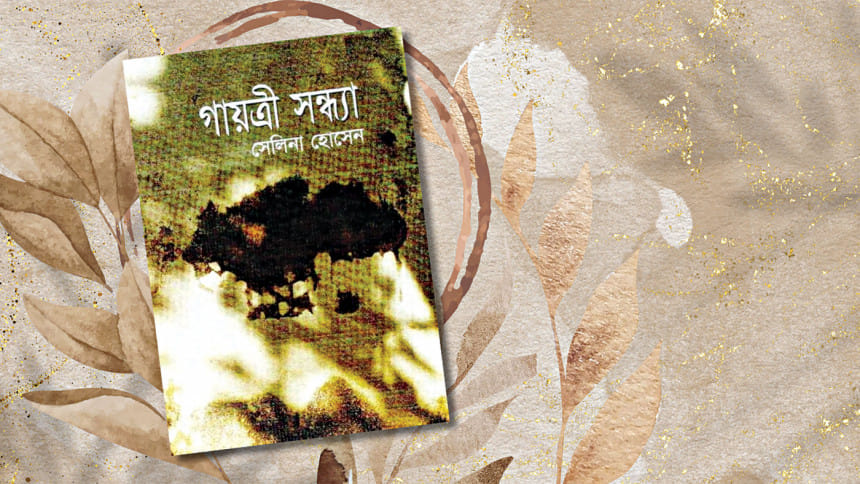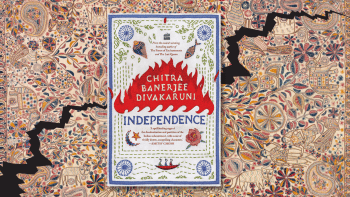‘Gayatri Sandhya’ is a document of the broken dreams of our people

Selina Hossain is a celebrated novelist in the realm of Bangla literature. In the creative embrace of her work, all manner of deprivations, class discrimination, oppression, struggles, and achievements from the colonial era to the modern times have found a space. The subject matter of Selina Hossain's writings are multidimensional. The Language Movement, Liberation War, middle class struggle, the history as well as stories of women achieving the unachievable have not only bloomed thoroughly through her work, but have also reached a different level. Throughout an illustrious life of 76 years, her numerous works have made Bangla literature richer. She is a beacon of honesty in the pursuit of literature. She has always been vocal against all sorts of oppression and exploitation in society. The middle class lifestyle has been the central focus of her work, as has contemporary thinking, and analytical self reflection. Selina Hossain has foraged from life and nature the human struggle of establishing oneself. The necessities of time have forced her to examine Partition, the Language Movement, the mass uprising, and the Liberation War. The cultural significance of contemporary Bengali politics, social policy, and mass movement has been expressed through her novels time and again.
Selina Hossain's Gayatri Sandhya is a novel in three parts. It is a political novel about the period between 1947 and 1971. The novel was written about the history of dreams dreamt and dreams broken for a people who were vocally aware of their political rights. In 1994-94, she was awarded a scholarship from the Ford Foundation for Gayatri Sandhya, as well as the "Rabindra Memorial" award from the Indian Institute of Planning and Management. On September 27, 2019, she spoke about her perceptive feelings of Gayatri Sandhya in an event organised by Ekushey Academy Australia Inc., and captivated the audience. She was given the "Ekushey Academy Australia Honours 2019" on that day.
In Gayatri Sandhya, Selina Hossain painted on a large canvas, in minute and descriptive detail, the history of the years between 1947 and 1971. The family of Ali Ahamad had to leave their residence after Partition and settle in the Rajshahi area of modern day Bangladesh. The hearts of every member of the family bled. Where was the ever familiar, beloved land of their birth, asks the author. Hossain sheds light on how bifurcated their spiritual existence was after being forced to make a new home in Rajshahi. In Gayatri Sandhya, the writer tracks the course of history, using different characters as her guide on the path to a final conclusion. Selina Hossain once said, "I have written Gayatri Sandhya based on the socio-economic and political background of this country. In three parts, the novel starts from 1947. It ends with the context for the murder of Bangabandhu in 1975. The basic idea of this novel is the identity crisis we faced in the new nation called Pakistan after 1947. The protagonist of my novel was chased away from his country during Partition simply because he was a Musalman. But then, in 1971, he was killed for being a Bangalee. The larger canvas of this novel is this socio-economic and political background, and I think this novel has various materials that will help the reader to think a bit differently."
The first part of the Gayatri Sandhya trilogy spanned the period between the Partition of 1947 and the military rule of 1958. On February 21, 1952, students broke section 144 to bring out processions as part of the Language Movement. The police fired indiscriminately on them. Many died on the spot, including Abdul Jabbar, Rafiq, Barkat. Many were wounded, a number of dead bodies were secretly taken away. Mofijul represented a missing dead body, Ohi was wounded. In Selina Hossain's Gayatri Sandhya, this is how the characters spoke of the events of the day: "Ali Ahmad sat dismayed after reading the newspaper. He's been carrying a fever for two days. The events of the 21st—the tear gas and baton charge—wounded him. Mofijul was close to him, but he didn't know which way the crowd took him. Mofijul, until now, is unable to think. Pradipta reads the news and shouts, Baba! Here is our Ohi. Ohiullah!"
During the period following Partition, the rapidly changing situation in the socio-economic and political context was brilliantly laid out by the writer. But the difficulty of empathising with the awful feelings borne out of separation and torture that was present in the depths of everyone's heart came out loudly through Selina Hossain's words. She observes, "I do not possess the ability to understand that. I possess the conflict between how successful the pains of transformation are and whether it will succeed at all. The Pakistan that was born out of a religious and communal national spirit was the Pakistan that Bangalees had to fight for the purpose of their existence."
In the second part of the story, social life is beset with all sorts of chaos during military rule. East Bengal remained deprived on all fronts—education, employment, literature, industry, and culture. Meanwhile in the third part of Gayatri Sandhya, Selina Hossain begins with a comment remembering renowned thinker S Wajed Ali that is worthy of special attention. "Bangabandhu Sheikh Mujibur Rahman, to me, seems like that figure of a Great Man in history. He has given Bangalees a taste of that glorious life, Bangalees have experienced a unique way of living." The leadership of Bangabandhu Sheikh Mujib sowed in the hearts of the people of Bengal a dream of coming alive anew. The writer paints a picture of that time brilliantly through the character of Ali Ahmad.
Ali Ahmad witnessed both the reality of tyranny and torture in East Pakistan, and the struggle of the hopeful who sought freedom. The novelist also described the Agartala conspiracy case and the torture that even Bangabandhu's associates were not spared from. It was none other than Bangabandhu Sheikh Mujibur Rahman who repeatedly embraced imprisonment for the liberation of the people of Bengal.
In Gayatri Sandhya, the writer flawlessly portrayed the picture of life during a long period of 28 years, complete with the social, political, economical, and cultural heritage that defined it. After the partition of 1947, when people left their homes in West Bengal to come to East Pakistan as refugees with empty, yearning hearts, a child was born in a train in a remote place. A new child is born, along with a new country. The child's father is the teacher of Bangla literature, Ali Ahmad. The character of Pushpita, who is adorned with the eternal maternal love of Bengal, carries on with life alongside her brother Pradipta, and history carries on alongside them. At the same time, the pain of being uprooted and the struggle of surviving in a new country for other families who took refuge in East Pakistan, the tensions of a country that was borne out of the communal spirit of a specific religious belief, and the Tebhaga movement came to the forefront of this story.
Selina Hossain's Gayatri Sandhya is an epic novel. It is the unified terrain of Bangladesh and Bangalee life. It is the terrain around which the dreams of the Bangalee nation is built, it is the terrain on which Bangalee dreams are adorned with the presence of the father of our nation, Bangabandhu Sheikh Mujibur Rahman. He showed us the dream, a dream of living a life with rights. This dream was destroyed when he was murdered. The land that is for the people is where every day, the songs of blessings are played during gayatri sandhya. It is the land where the people create a history of dreams fulfilled.
The article has been translated from Bangla by Azmin Azran. The original article appeared in Jugantor.
Dr Nasrin Jabin is an assistant professor of Bangla at North South University. She is the author of several novels and essays and has also been published in research journals and newspapers. She has recently won the Dineshchandra Sen Memorial Gold Award in India.

 For all latest news, follow The Daily Star's Google News channel.
For all latest news, follow The Daily Star's Google News channel. 








Comments